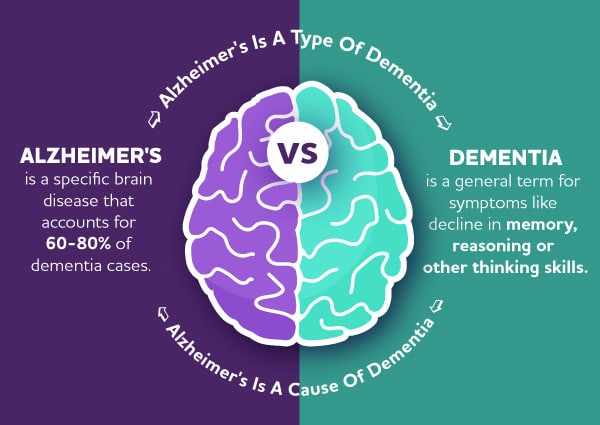Dementia is a broad term used to describe a decline in cognitive function severe enough to interfere with daily life. It primarily affects seniors and is characterized by memory loss, confusion, impaired judgment, and changes in personality. Dementia is not a specific disease but a collection of symptoms that can result from various diseases or conditions. Understanding the different forms of dementia and how caregivers can help is crucial for providing effective care and improving the quality of life for those affected.
Common Forms of Dementia

1. Alzheimer’s Disease:
Alzheimer’s disease is the most common form of dementia, accounting for 60-80% of cases. It is a progressive neurological disorder that leads to the gradual loss of memory, thinking skills, and the ability to perform simple tasks. Early symptoms include difficulty remembering recent events, while later stages involve severe memory impairment, confusion, and personality changes. The exact cause is not fully understood, but it is associated with the buildup of amyloid plaques and tau tangles in the brain.
Famous people afflicted with Alzheimer’s Disease include: Glen Campbell, Peter Falk, James Doohan (Star Trek’s Scotty), and Ronald Reagan.
2. Vascular Dementia:
Vascular dementia is the second most common type of dementia and occurs due to reduced blood flow to the brain, often after a stroke or series of mini-strokes. The symptoms can vary depending on the part of the brain affected but typically include difficulties with problem-solving, slowed thinking, and impaired focus. Unlike Alzheimer’s, memory loss might not be the first symptom, and the progression can be different, with sudden worsening of symptoms following each stroke.
3. Lewy Body Dementia (LBD):
Lewy body dementia is characterized by the presence of abnormal protein deposits called Lewy bodies in the brain. Symptoms include fluctuations in cognitive abilities, visual hallucinations, and motor symptoms similar to Parkinson’s disease, such as tremors and stiffness. LBD can be challenging to diagnose because its symptoms overlap with both Alzheimer’s and Parkinson’s diseases.
Robin Williams is, perhaps, the most famous famous person who suffered from Lewy Body Dementia.
4. Frontotemporal Dementia (FTD):
Frontotemporal dementia affects the frontal and temporal lobes of the brain, which are responsible for behaviour, personality, and language. Unlike Alzheimer’s, FTD often leads to changes in personality and behaviour before memory loss occurs. Patients may exhibit socially inappropriate behaviour, apathy, or language difficulties. FTD typically has an earlier onset than other dementias, often occurring in people in their 50s or 60s.
Bruce Willis announced he was suffering from Frontotemporal Dementia in early 2023.
5. Mixed Dementia:
Mixed dementia is a condition in which multiple types of dementia occur simultaneously, most commonly Alzheimer’s Disease and Vascular Dementia. The symptoms of mixed dementia may vary, but they often include a combination of memory problems and issues with decision-making, problem-solving, and behaviour.

Challenges faced by caregivers
Caring for someone with dementia presents numerous challenges, both emotional and physical. As dementia progresses, patients require increasing levels of care, which can be overwhelming for caregivers.
Dementia can cause significant behavioural changes, such as aggression, agitation, and wandering. These behaviours can be difficult to manage, particularly when they are unpredictable. Difficulty communicating is another challenge. And of course, the physical demands of care can be demanding. Caregivers should be trained, in order to avoid injury—both for the patient and the caregiver. For loved ones, the emotional impact, the amount of time required and financial pressures all contribute to an untenable situation.
How caregivers can help
1. Education and training:
Understanding the specific type of dementia and its symptoms is crucial for providing effective care. Training in communication techniques, behavioural management, and safety is essential.
2. Creating a safe environment:
Safety is a primary concern for individuals with dementia. Caregivers can help by modifying the home environment to reduce hazards. This may include removing tripping hazards, installing grab bars, and ensuring that sharp objects and medications are securely stored. Wandering can be a significant risk, so installing locks or alarms on doors and windows may be necessary.
3. Establishing routines:
People with dementia often find comfort in routines. Establishing a consistent daily schedule can help reduce confusion and anxiety. Activities such as meals, bathing, and bedtime should occur at the same time each day. Simplifying tasks and breaking them down into smaller steps can also make daily routines more manageable.
4. Supporting communication:
Effective communication is key to providing care. Caregivers should use clear, simple language, maintain eye contact, and be patient when speaking with someone with dementia. It can be helpful to use non-verbal cues, such as gestures and facial expressions, to aid understanding. Listening actively and validating the person’s feelings, even if they seem irrational, can also help to reduce frustration and improve the caregiving relationship.
5. Managing behavioural changes:
Understanding the triggers for behavioural changes is crucial. Caregivers should observe and identify patterns in behaviour to anticipate and prevent outbursts. Using distraction techniques, such as engaging the person in a favourite activity, can help to de-escalate situations. In some cases, consulting with a healthcare professional to explore medications or other interventions may be necessary.
6. Encouraging social interaction:
Social isolation can exacerbate dementia symptoms. Social engagement can help to stimulate cognitive function and improve the person’s mood.
Caring for someone with dementia is challenging but deeply meaningful. By understanding the different forms of dementia and implementing effective caregiving strategies, caregivers can provide compassionate care that enhances the quality of life for their loved ones. While the journey is not easy, the support of healthcare professionals, community resources, and other caregivers can make a significant difference in managing the challenges of dementia care.


